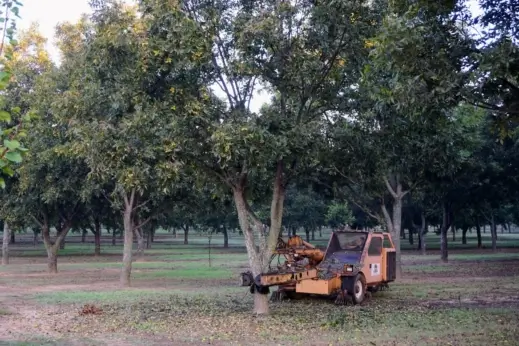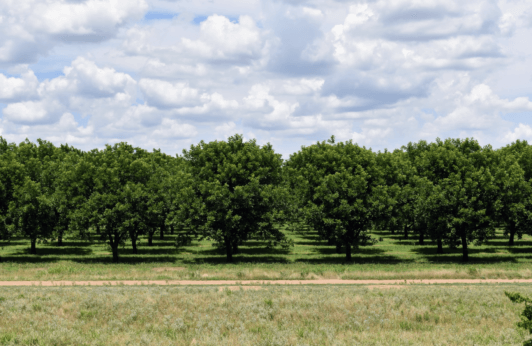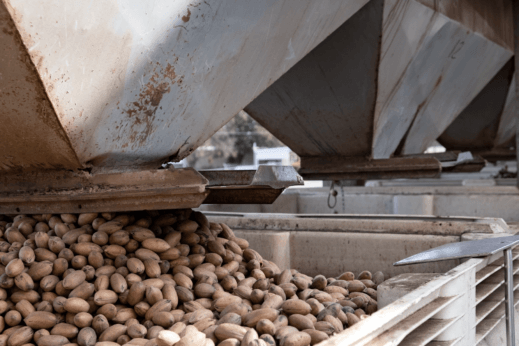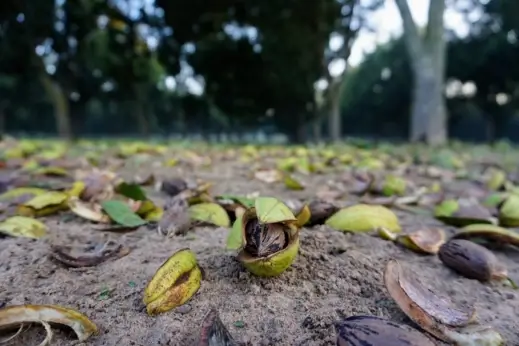Meet the Pecan Farmer Who Wants to Change the Plant-Based Milk Scene
Pecans, although not as widely grown as other nuts, make a delicious milk alternative. One farmer wants the world to try them.
Meet the Pecan Farmer Who Wants to Change the Plant-Based Milk Scene
Pecans, although not as widely grown as other nuts, make a delicious milk alternative. One farmer wants the world to try them.

via Chase Pecan.
The wild pecan (Carya illionoisnensis) is the only major nut native to North America (depending upon who you talk to, that is. Some say it’s the only native nut, while others cite the eastern American black walnut as an indigenous species). The drought-tolerant trees grow in a belt that extends from northern Mexico to northern Illinois, with the pecans peaking in Texas, New Mexico and Georgia.

Plant-based milks have proliferated in the marketplace over the past 15 years; a 2020 study notes that they accounted for 15 percent of all milk sales and 35 percent of the plant-based food category, totaling $2.6 billion in sales.
And there are a lot of milk alternatives out there. Almond, pistachio, macadamia, hazelnut, walnut, cashew, peanut, soy, pea, potato, oat and hemp are just some of the options for anyone forgoing traditional dairy. Yet, pecan milk has been largely absent from the plant milk space.
“I feel like pecans haven’t had a place in the market because no one grower or conglomerate had a significant supply of nuts to make the milk into a national or global product,” says Kortney Chase. Growing up in southeastern New Mexico, her family would harvest pecans from their farm and make creamy milk from the buttery-tasting nuts. The family would add it to cereal or drink it straight. Years later, Chase wanted to share her love of pecan milk with the world, so she launched Pecana, in late 2023.

People have tried to introduce pecan milk into the plant-based space before, with varying degrees of success. In 2014, Houston’s MALK Organics became the first brand to make pecan milk, although it was later discontinued; the company now makes almond and oat milk. In 2015 and 2016, Atlanta became home to Treehouse Naturals and Pecan Milk Co-op, respectively. The former is now the only brand manufacturing canned pecan milk.
Pecana sources its pecans directly from its own farms—those same orchards in which Chase grew up. A third-generation pecan farmer, Chase’s family started Chase Pecan in Artesia, New Mexico, in 1986. In 2003, Chase Pecan relocated from New Mexico to San Saba, Texas, the self-proclaimed “Pecan Capital of the World.” The Hill Country town is home to what may be the oldest fossilized pecans on record; the remnants discovered on the banks of the Colorado River in San Saba are estimated to be at least 65 million years old.
But, the pecan holds a special place for Texans in particular; in 1919, it was declared the state tree because of its role in Texas heritage, economy and culture. Pecans were also a crucial food source for the indigenous peoples of the region, whose upriver trade routes expanded the nut’s habitat and eventual agricultural terrain. But pecan growers in Texas have faced hardship in recent years due to climate change, crop input costs, water expenses and lack of labor.

Chase Pecan is now the leading grower of pecans, with 13,000 cultivated acres comprised of tenant farmer-occupied estate orchards and small family farms in Texas, New Mexico and Arizona, with roughly 3,000 acres of that land dedicated to organic farming. The company specializes in the Pawnee (a large, buttery variety popularized in the western states by Kortney Chase’s father, Richard) and Western Schley (a small, crunchy variety) pecans. It’s also one of the largest manufacturers of pecans, harvesting an average of 20 million pounds of nuts annually, which ensures Pecana gets a consistent supply.
After graduating college in 2011, Chase set out to learn the manufacturing side of her family’s business, as well as doing sales and market research. “I would look at certain products like nut milk and wonder why they weren’t made with pecans,” she says.
It wasn’t until the pandemic, however, that Chase began formulating a “commercial nut milk that I wanted to drink.” While higher in fat and calories than almonds, walnuts, hazelnuts and cashews, pecans make an indisputably creamy milk and, unlike oats, they don’t require the addition of canola or sunflower oil to yield a product with an equivalent consistency.

Because pecan milk is so new to the marketplace, there’s little data comparing it to other plant milks, but its lower environmental imprint and the crop’s long production cycle bode well for the future of the industry. Pecan trees take five to seven years to bear fruit, but they produce for up to 300 years. By contrast, almond trees don’t bear fruit for three years and have an average production span of 25 years, while English walnuts bear fruit in four to seven years and have a 30-year production period.
Pecans are also wind-pollinated, which means the trees can reproduce without human or insect intervention. These cross-pollinated trees yield larger, higher-quality orchard nuts (commercial pecan varieties are hybrids developed through controlled pollination).
Almonds, by contrast, require pollinators for reproduction. California produces 80 percent of the global almond crop, which is aided by the importation of European honeybees, which then compete with and displace native species. Imported bees also die in large numbers due to pesticide exposure, parasites and disease.

Regardless of the type of plant milk you consume, “all tree nuts and legumes are, generally speaking, far more sustainable from orchard to manufacture than any milk from an animal,” says Dana Ellis Hunnes, a dietitian and assistant professor at UCLA’s Fielding School of Public Health. “However, the degree of sustainability for one nut or legume to another varies as some are more water intensive than others, but tree nuts are a carbon sink because trees pull carbon out of the atmosphere and into their roots. Plant milks also require 50-percent less water and up to 10-percent less land than cow’s milk and produce minimal greenhouse gasses.”
While dairy milk shouldn’t be demonized, it does come with a more significant environmental footprint. “The primary reason is that you have to feed a pregnant or lactating animal more food, and this is inefficient,” says Hunnes. “When you consider the water use, emissions produced by the animals themselves and land use, plant milks will always win.”
Follow us
This work is licensed under a Creative Commons Attribution-NoDerivatives 4.0 International License.
Want to republish a Modern Farmer story?
We are happy for Modern Farmer stories to be shared, and encourage you to republish our articles for your audience. When doing so, we ask that you follow these guidelines:
Please credit us and our writers
For the author byline, please use “Author Name, Modern Farmer.” At the top of our stories, if on the web, please include this text and link: “This story was originally published by Modern Farmer.”
Please make sure to include a link back to either our home page or the article URL.
At the bottom of the story, please include the following text:
“Modern Farmer is a nonprofit initiative dedicated to raising awareness and catalyzing action at the intersection of food, agriculture, and society. Read more at <link>Modern Farmer</link>.”
Use our widget
We’d like to be able to track our stories, so we ask that if you republish our content, you do so using our widget (located on the left hand side of the article). The HTML code has a built-in tracker that tells us the data and domain where the story was published, as well as view counts.
Check the image requirements
It’s your responsibility to confirm you're licensed to republish images in our articles. Some images, such as those from commercial providers, don't allow their images to be republished without permission or payment. Copyright terms are generally listed in the image caption and attribution. You are welcome to omit our images or substitute with your own. Charts and interactive graphics follow the same rules.
Don’t change too much. Or, ask us first.
Articles must be republished in their entirety. It’s okay to change references to time (“today” to “yesterday”) or location (“Iowa City, IA” to “here”). But please keep everything else the same.
If you feel strongly that a more material edit needs to be made, get in touch with us at [email protected]. We’re happy to discuss it with the original author, but we must have prior approval for changes before publication.
Special cases
Extracts. You may run the first few lines or paragraphs of the article and then say: “Read the full article at Modern Farmer” with a link back to the original article.
Quotes. You may quote authors provided you include a link back to the article URL.
Translations. These require writer approval. To inquire about translation of a Modern Farmer article, contact us at [email protected]
Signed consent / copyright release forms. These are not required, provided you are following these guidelines.
Print. Articles can be republished in print under these same rules, with the exception that you do not need to include the links.
Tag us
When sharing the story on social media, please tag us using the following: - Twitter (@ModFarm) - Facebook (@ModernFarmerMedia) - Instagram (@modfarm)
Use our content respectfully
Modern Farmer is a nonprofit and as such we share our content for free and in good faith in order to reach new audiences. Respectfully,
No selling ads against our stories. It’s okay to put our stories on pages with ads.
Don’t republish our material wholesale, or automatically; you need to select stories to be republished individually.
You have no rights to sell, license, syndicate, or otherwise represent yourself as the authorized owner of our material to any third parties. This means that you cannot actively publish or submit our work for syndication to third party platforms or apps like Apple News or Google News. We understand that publishers cannot fully control when certain third parties automatically summarize or crawl content from publishers’ own sites.
Keep in touch
We want to hear from you if you love Modern Farmer content, have a collaboration idea, or anything else to share. As a nonprofit outlet, we work in service of our community and are always open to comments, feedback, and ideas. Contact us at [email protected].by Laurel Miller, Modern Farmer
June 10, 2024
Modern Farmer Weekly
Solutions Hub
Innovations, ideas and inspiration. Actionable solutions for a resilient food system.
ExploreShare With Us
We want to hear from Modern Farmer readers who have thoughtful commentary, actionable solutions, or helpful ideas to share.
SubmitNecessary cookies are absolutely essential for the website to function properly. This category only includes cookies that ensures basic functionalities and security features of the website. These cookies do not store any personal information.
Any cookies that may not be particularly necessary for the website to function and are used specifically to collect user personal data via analytics, ads, other embedded contents are termed as non-necessary cookies.
Only ‘major’ native nut in the US might be more accurately stated as ‘Only native nut under large scale commercial cultivation.’
There are plenty of other nuts native to N America including a few species of black walnuts, several species of hickory (some of which are tastier than pecans), two species of hazelnut, pine nuts, butternuts, American chestnuts, chinkapins and probably more. The difference is most of those are limited to small scale cultivation, or strictly wild harvest.
https://thispkn.com/
Pecan Milk Co-op was established in 2014 according to pecanmilk.com, their website. An LLC search also confirms the date.